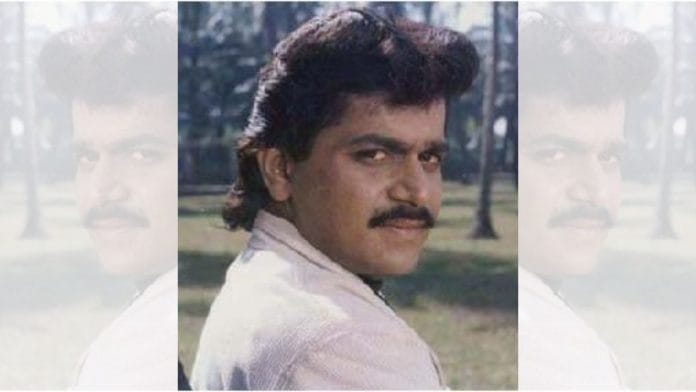New Delhi: Marathi superstar Laxmikant Berde learned about the death of his father during the interval of his first major play, Tour Tour. But the actor composed himself and returned to the stage; finishing the show before he could mourn.
To Marathi audiences of the 1980s and 1990s, Berde was synonymous with slapstick comedy and parody songs. They weren’t keen on exploring his gravitas—something he was well aware of.
In an interview for Doordarshan Sahyadri’s Chanderi Soneri, Berde said, “Our [actors’] image is trapped in a cage and it has three keys. One is with the audience, one with the director, and one with the producer. Unless all three turn the key and let us out, we’ll stay inside.”
And when Berde began acting in Marathi films, the status of a star was out of reach for comedy actors; it hadn’t been done since Dada Kondke. Even Berde’s first on-screen role in Alka Kubal’s Lek Chalali Sasarla (1984) was a sombre one.
His second film, Dhoom Dhadaka (1985), turned him into a star, breaking the pattern. It sprung a wave of comedy movies like Amhi Doghe Raja Rani (1986), De Dana Dan (1987), and Chal Re Laxya Mumbaila (1987), most of them banking on Berde’s star power. His characters were named some variation of ‘Laxya’ in all his biggest hits, which also became a real-life nickname.
Berde’s innate talent took Marathi comedy films to new heights. Ashok Saraf, who had amassed considerable success in the genre, got a new push when paired with Berde. The duo carried forward Kondke’s tradition and later bequeathed it to the likes of Bharat Jadhav and Makarand Anaspure.
Also read: Guru Dutt turned melancholia into art. He was ‘lost in filmmaking, lost to life’
For the people
Out of all the comedic talents in Maharashtra, Berde has been the most adored. His characters were as innocent as they were energetic, making him an instant favourite.
“It’ll now be 20 years since my father passed away, and he’s still fresh in people’s memories—he’s a big part of their childhood,” actor Abhinay Berde told ThePrint. “There have been people who did greater work than Laxmikant Berde, but they’re not remembered with nearly the same amount of love.”
According to Abhinay, Berde’s stardom grew due to the amount of affection he had for people, both in his professional and personal lives. He enjoyed bringing people together and especially loved celebrating Diwali, when the entire family got together to burst crackers.
Even at the peak of his career, Berde understood the pitfalls of fame and the importance of humility. One of his shoots in Satara drew hordes of people to the scene and they began crowding his brand-new car, climbing over it and banging on the doors and windows. Berde simply got out and handed over the keys to the mob.
“This isn’t my car, you can go ahead and break it. After all, I’ve bought it with your money,” the actor said.
Also read: MN Nambiar, Tamil cinema’s most convincing villain wielded swords with MGR, worshipped Ayyappa
Honing his craft
In the Chanderi Soneri interview, Laxmikant Berde said that his father wasn’t sure he’d pass the matriculation exam and got him a job. But he had always wanted to be an actor, so he quit and started working at Mumbai Marathi Sahitya Sangh, a theatre production company.
While he didn’t get major roles, the seven years he spent at the company shaped Berde’s comic timing and mannerisms. When he wasn’t on stage, he would sit among the audience and observe which jokes worked and which ones didn’t.
Berde recalled a 1989 show of the play Bighadale Swargache Daar, in which a minister wants to rule heaven after his death. During the scene, Berde improvised, asking the minister if he was from Baramati—an allusion to Sharad Pawar.
“Even Raja Gawade [the co-actor] was shocked, and there was tremendous laughter,” the actor said.
Berde attempted to break free of the comedy mould with Ek Hota Vidushak (1992), a nod to Raj Kapoor’s Mera Naam Joker (1970). In the film, he played Aburao, a Tamasha artist who begins to betray his principles after gaining fame in cinema and politics. Filmmaker Jabbar Patel based the script on his own short story and PL Deshpande penned the dialogue.
After being approached by Patel for the lead role, Berde was involved in every aspect of the film, even roping in actress Varsha Usgaonkar as one of the leads. Perhaps he saw some of himself in Aburao, a folk artist who sacrifices himself at the altar of fame.
Ek Hota Vidushak won the National Film Award for Best Feature Film in Marathi and won six awards at the Maharastra State Film Awards. But Berde wasn’t nominated in the Best Actor category. The film’s failure at the box office and the lack of recognition for his acting affected Berde greatly.
“He was a very emotional man,” said Abhinay. “There are some things in the industry that one doesn’t have to take personally, but he did. That’s not a fault of his, he just loved people and wanted to make them happy.”
Ultimately, the audience didn’t turn the key and Berde accepted its mandate, returning to comedy. He starred in several Marathi and Hindi films, the most memorable of which are Zapatlela (1993) and Hum Aapke Hain Koun..! (1994). He died on 16 December 2004 due to a kidney ailment.
In an interview with Lokmat Filmy, Usgaonkar said, “Laxya should have received that award. If he had, it would’ve revealed a different aspect of him… He could have broken out of his image.”
(Edited by Theres Sudeep)






